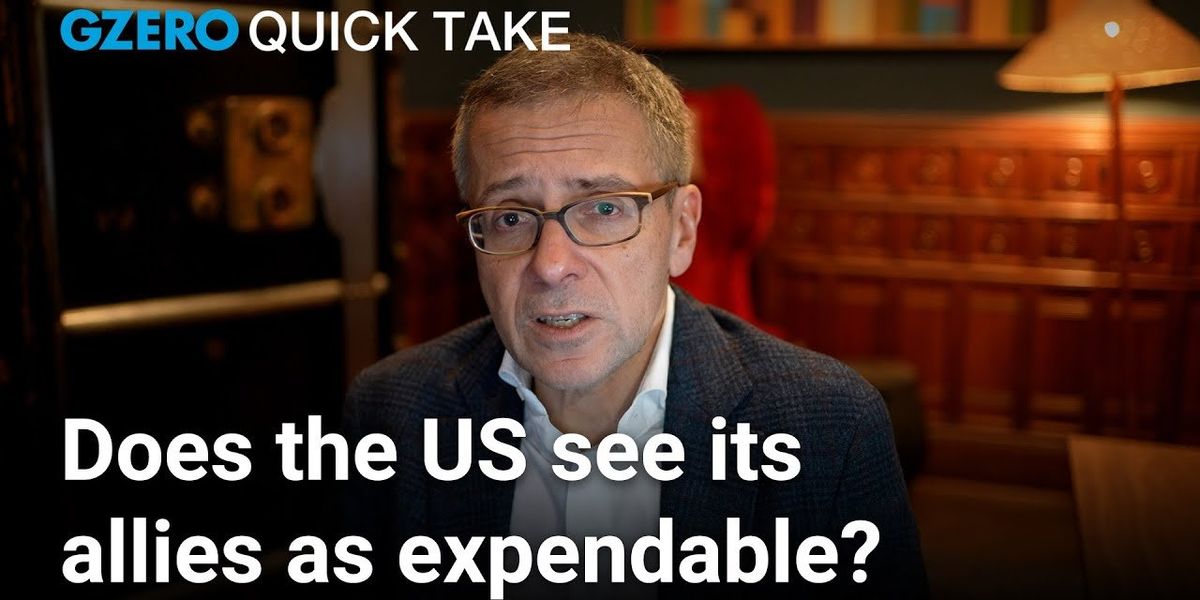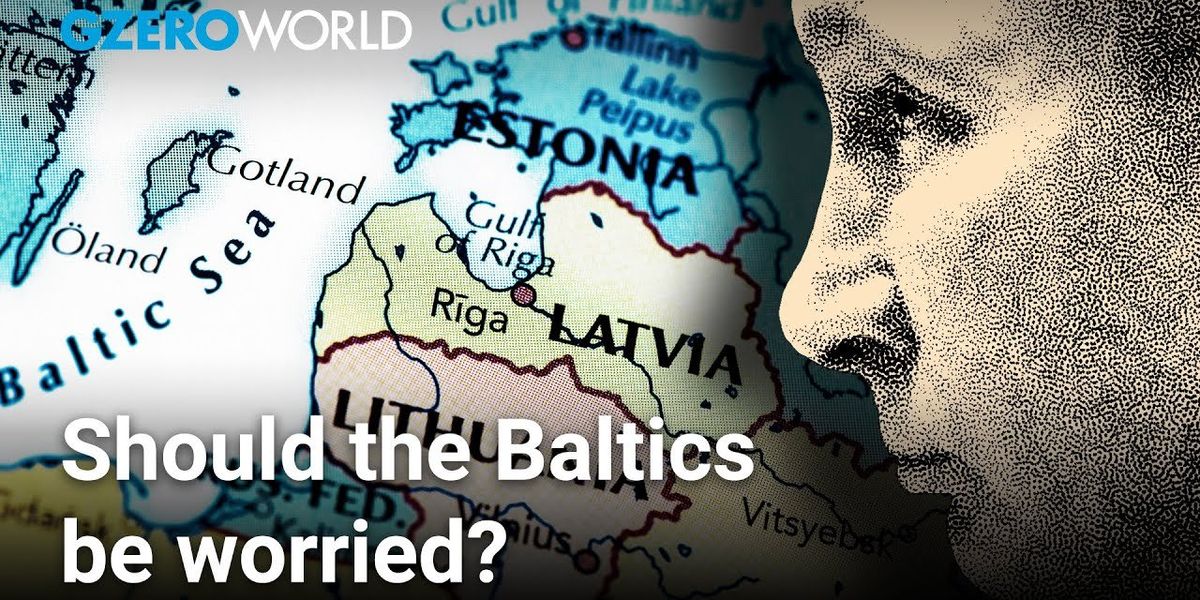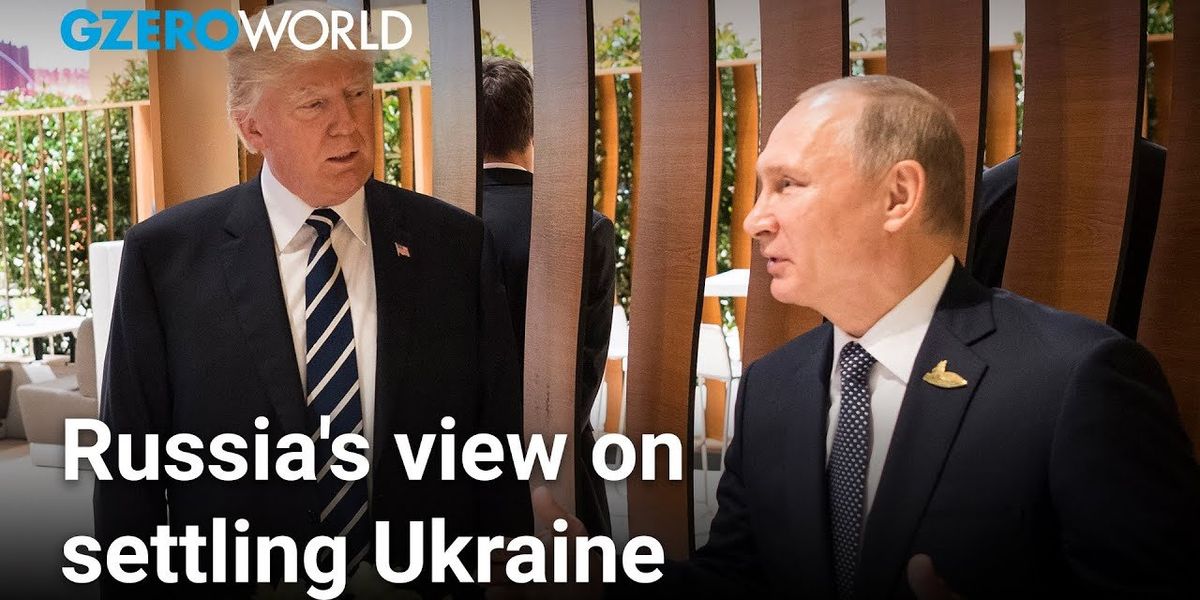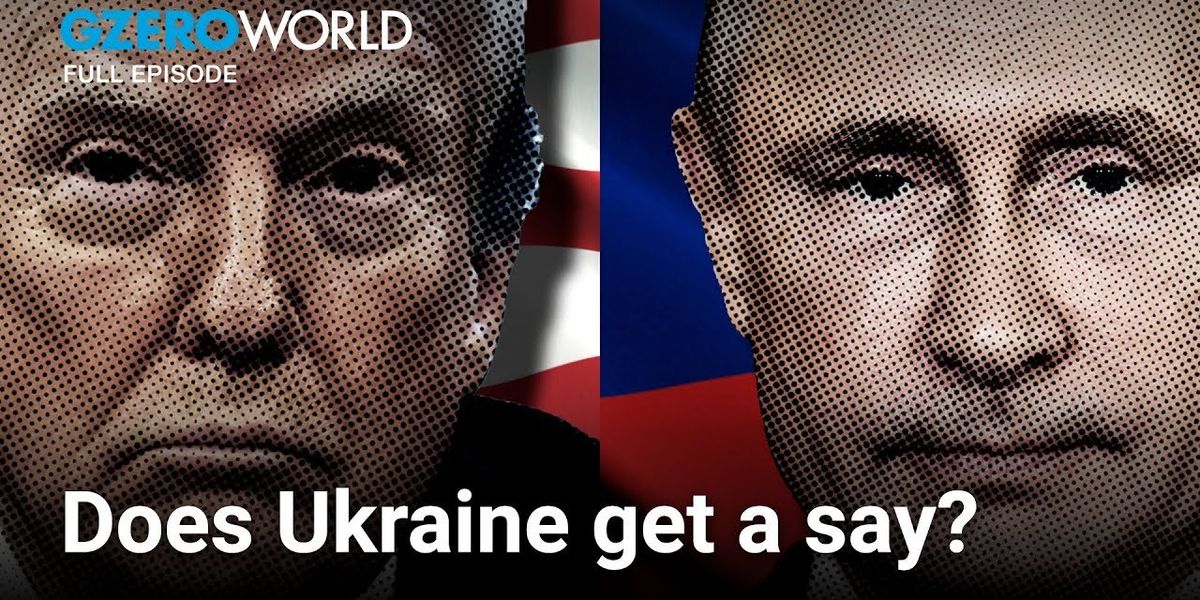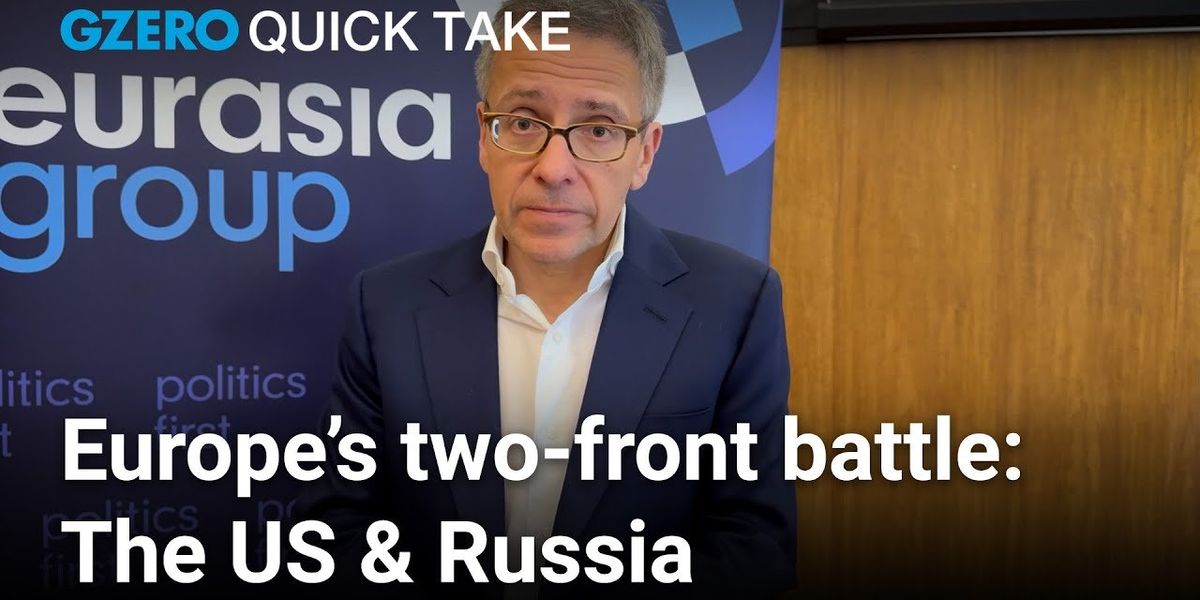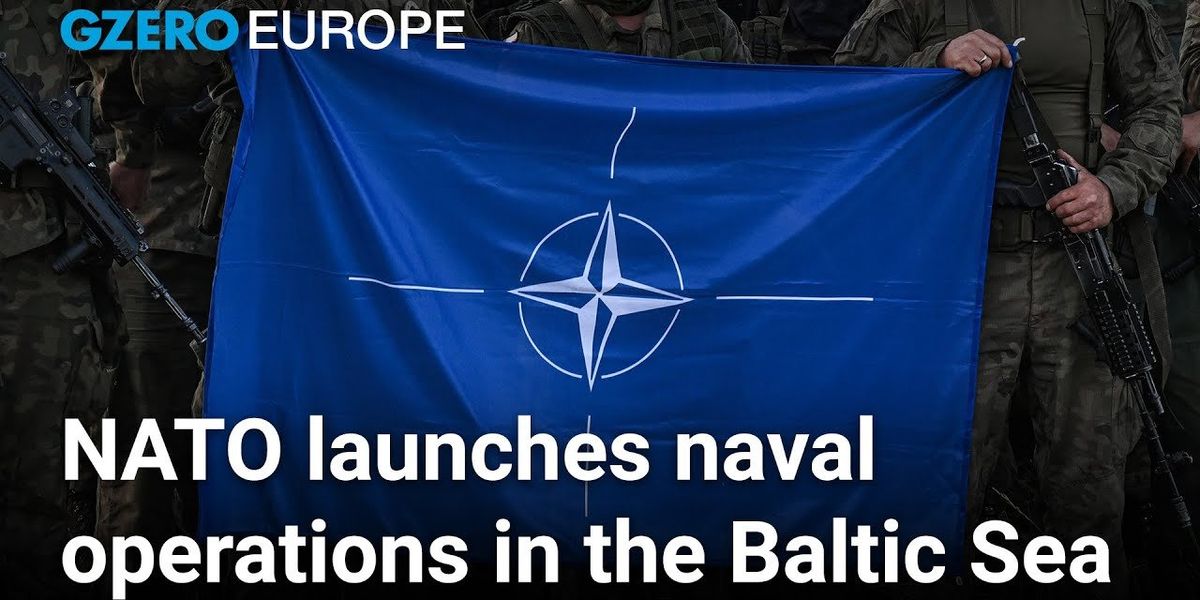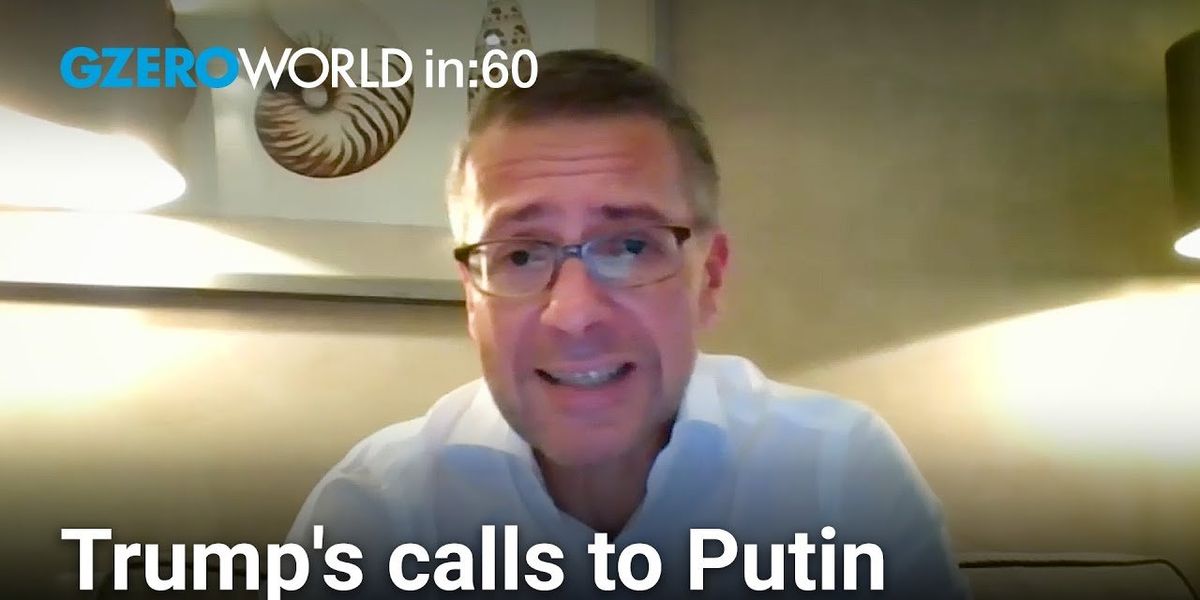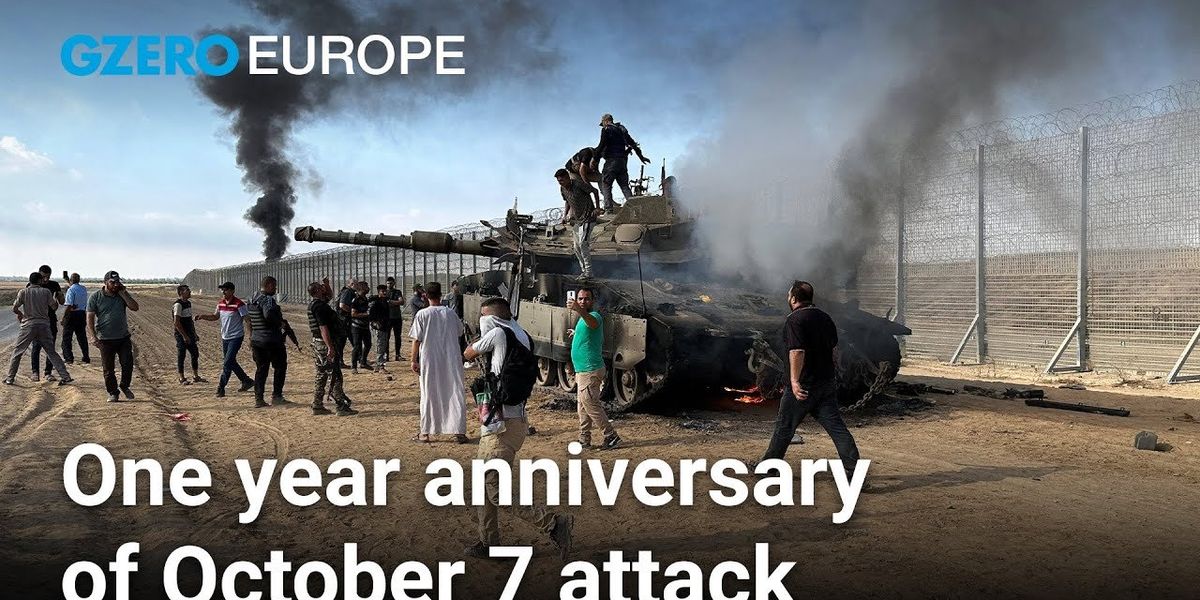Trending Now
We have updated our Privacy Policy and Terms of Use for Eurasia Group and its affiliates, including GZERO Media, to clarify the types of data we collect, how we collect it, how we use data and with whom we share data. By using our website you consent to our Terms and Conditions and Privacy Policy, including the transfer of your personal data to the United States from your country of residence, and our use of cookies described in our Cookie Policy.
{{ subpage.title }}
If Trump's foreign policy pushes allies away, can the US go it alone?
Ian Bremmer's Quick Take: A Quick Take to kick off your week. Marco Rubio heading to Saudi Arabia to talk with the Ukrainians. That's clearly the most important of a lot of moving parts geopolitically in the world right now. I say that because so much of what the Americans decide to do and not do with the Ukrainians is going to have massive impact on the transatlantic relationship, on NATO, on US-Europe relations, and on the nature of what has been the most important collective security arrangement in the world and is now experiencing crisis. It's very clear that the Ukrainians, as Trump says, lack the cards. And so the outcome is going to be determined largely by countries outside of Ukraine, not just the willingness and the capacity of the Ukrainians themselves to continue to fight. The United States, on the one hand, is pushing the Europeans to do a lot more. A lot more in terms of providing economic support, providing military support, and having a security backstop for a post-ceasefire environment that the Americans are not prepared to participate in.
Now, if all of that happens, and of course that's a big if, but certainly the Europeans are moving in that direction, then the interesting point is the Americans aren't going to determine the outcome. In the sense that the ultimate ceasefire terms will be driven not by the United States, who's basically saying, "We're washing our hands of it." But instead by the Europeans and the Ukrainians, in concert with Russia. And first of all, that's analogous to what's been happening in the Middle East. Everybody remembers that Trump said, "We're going to own Gaza and all the Palestinians are going to leave," and of course, that's not where we're heading. And the eventual outcome will be determined overwhelmingly by the countries that are prepared to spend the actual money and provide the security and figure out the politics. And that means the Arab States, that means Egypt and Jordan, it means Saudi Arabia and the UAE, and it means the potential for blocking by Israel.
That's the environment that we are increasingly going to be seeing on the ground in Ukraine. That the Europeans are going to be doing the driving. The Ukrainians are going to have to align with that and the blocking potentially by Russia. The big difference, of course, is that in the case of Ukraine, the United States is also very interested in doing a deal with Russia over the head of the Ukrainians and the Europeans. There's no equivalent in the Middle East at all. And here, the reason it's so important is because the ability of the Ukrainians to continue to engage in their willingness with the US and Europe together will determine in large part whether a deal between the US and Russia involves a ceasefire with Ukraine or doesn't. If Trump can say, "Hey, the reason we didn't get a deal and the reason they're still fighting is because Ukraine refuses to be a part of it," then a deal with Russia is actually much easier to get to by Trump. Because it involves just re-engagement diplomatically, investment by the US and Russia, joint projects, reopening of arms control conversations, and doesn't involve a Ukraine ceasefire.
Trump has said, "Not only does Ukraine not have cards, but Russia doesn't have cards." Of course, the reality is that if the Russians are willing to do the fighting for a longer period of time, and the Americans don't care and the Europeans can't stand up, then the Russians are the ones with the cards. That is where we are heading. And if the Americans are prepared to do a deal with the Russians irrespective of what happens on the ground in Ukraine, and that is being tested very much over the coming days, that's perhaps the most important outcome of what we see from the US-Ukrainian talks in Saudi Arabia, then the transatlantic relationship is in a lot more trouble than it is right now.
So I think those are the pieces that we're talking about here. It is very clear that the Americans see alliances and see allies as expendable, that it's not that important for the Americans to treat allies with respect. If they're smaller, if they're less powerful, you can do whatever you want. And we saw that with Elon Musk beating up on Poland and the Foreign Minister, Radek Sikorski, someone I've been actually friends with for a very long time, and I think that's not a smart way to conduct business. Poland's been a steadfast ally, they're spending upwards of 4% of their GDP on defense, heading towards 5% going forward. They've housed millions of Ukrainian refugees. They've done far more on the ground in Ukraine per capita than the Americans have on pretty much every front. And also, by the way, there are a lot of Polish Americans that vote, and some of them vote Republican. Far more important than the Ukrainian vote, for example, and that seems to matter too, but maybe not to Elon.
I think that these sorts of insults are unnecessary, and they damage American allies. But I think the Trump administration's perspective is as long as the US is the most powerful country in the world, that America alone is stronger than America with friends, and it's probably the area of greatest geopolitical disagreement that I have with this administration. But we will see how it plays out. I certainly agree that there will be a lot of wins that we will continue to see, because less powerful countries do not want to get into a big fight with the United States. But long-term, I think this is going to play out badly. And I particularly think that's true in the transatlantic relationship where permanent damage is being done irrespective of what happens after Trump. Anyway, a lot to talk about, a lot of moving pieces. We'll talk real soon, and that's it from me.
Could Russia invade the Baltics next?
Baltic leaders have few illusions that once Putin is done with Ukraine he won't look to his northwest neighbors next. On GZERO World with Ian Bremmer, Latvian Foreign Minister Baiba Braže addresses concerns about a potential Russian invasion of the Baltic states, saying that such a move would be an entirely new ballgame and would mean direct war with NATO; even still, Braže says, no scenario should be ruled out. “The task for all of us is not to exclude anything. So to be ready, to be prepared, to exercise, to test, and to make sure it doesn’t happen,” she says.
Braže underscores the importance of NATO’s deterrence strategy, stressing that the alliance must demonstrate both strength and resolve to prevent any miscalculations from Moscow. Beyond conventional military threats, she highlights the dangers of hybrid warfare, including cyberattacks and disinformation, as key battlegrounds in the ongoing struggle between Russia and the West.
Watch full episode: The fight to decide Ukraine's fate
GZERO World with Ian Bremmer, the award-winning weekly global affairs series, airs nationwide on US public television stations (check local listings).
New digital episodes of GZERO World are released every Monday on YouTube. Don't miss an episode: subscribe to GZERO's YouTube channel and turn on notifications (🔔).
Russian analyst: Let the US and Russia settle the Ukraine war
Who gets to decide Ukraine's future? On GZERO World with Ian Bremmer, former Russian colonel and ex-Carnegie Moscow Center director Dmitri Trenin argues that the real power players in the conflict are the United States and Russia—not Ukraine or Europe.
“There are two countries that have agency in the Ukraine conflict. One is the United States, and the other one is Russia,” he states, insisting that while Ukraine fights on the battlefield, its political decisions are dictated by Washington.
Trenin frames the war as a proxy conflict between two superpowers, arguing that any long-term peace deal must be negotiated primarily between Moscow and Washington.
GZERO World with Ian Bremmer, the award-winning weekly global affairs series, airs nationwide on US public television stations (check local listings).
New digital episodes of GZERO World are released every Monday on YouTube. Don't miss an episode: subscribe to GZERO's YouTube channel and turn on notifications (🔔).
The fight to decide Ukraine's fate
As Russia’s war in Ukraine grinds on, the Baltic states—Latvia, Estonia, and Lithuania—are watching their eastern neighbor with growing concern. With cyberattacks, undersea sabotage, and military buildup along its border, Latvia is at the forefront of Europe’s efforts to counter Russian aggression. On GZERO World, Latvian Foreign Minister Baiba Braže joins Ian Bremmer in New York to discuss Ukraine's fate, the region’s security challenges, the role of NATO, and how Trump’s evolving stance on Russia could leave European in the lurch.
Also on the show, Bremmer speaks with former Russian colonel Dmitri Trenin, who offers a starkly different perspective from Moscow, arguing that negotiations over Ukraine should be decided primarily by the US and Russia—not Ukraine or Europe.
GZERO World with Ian Bremmer, the award-winning weekly global affairs series, airs nationwide on US public television stations (check local listings).
New digital episodes of GZERO World are released every Monday on YouTube. Don't miss an episode: subscribe to GZERO's YouTube channel and turn on notifications (🔔).
Ukraine hopes for Europe's help as US negotiates with Russia
Ian Bremmer's Quick Take: So much going on around the major confrontation between Russia and Ukraine. The Americans now meeting with the Russians in Riyadh while the Europeans have had an immediate emergency summit, many of them. Not all of the EU, but rather if you will, a coalition of the capable and willing in Paris yesterday.
Where is all of this going? Well, the Europeans clearly now understand that they need to come up with a deal that includes Ukraine before the Americans and Russians create some kind of grand bargain, or a deal will be made over their heads, and probably one that they are not going to be very happy with. President Zelensky of Ukraine is looking much more desperate in this environment, understanding that he is in trouble, not only because his forces are having a hard time maintaining the front lines, that's been true for a while now, but also because he is in danger of losing the United States.
The deal that was offered by Secretary of Treasury Bessent to Zelensky in Kyiv in the past days was exploitative. It was referred to by Zelensky as colonial. It would have meant 50% of development rights, exploitation rights of European resources, Ukrainian resources would go to the United States in a privately held company that the Americans would own. And that this was going to pay primarily for aid that had already been given to the Ukrainians. In other words, under the Biden administration, which is kind of unprecedented and staggering, but nonetheless was the offer. He immediately rejected it, but of course, that has led to a big rift all of a sudden between the United States and Ukraine at a time where Zelensky had been doing everything possible to say, "Yes, we know we need peace. Yes, we know we need to work with Trump. Trump is a peacemaker. We're going to engage." That is a very different position right now.
So, he is counting more on the Europeans, but can the Europeans give him anything? Well, coming out of the meeting in Paris, the answer is not so much. First of all, because Olaf Scholz, who is still chancellor for another week before the Germans have elections, said that it was premature to talk about peacekeepers. Premature? When the Americans are about to cut a deal with the Russians, it's not premature. It's way too late. So Olaf looked weak, he looked bitter, and he undermined any possible consensus. So, this meeting was a real problem.
Still, you had Macron, who was talking about the need to commit peacekeepers. You had the Brits, who wavered. They were saying they're definitely going to commit, but only if there's American backstop, which the United States wouldn't support. Poland had said, "No," because they need all of their troops in Poland, which is a sign of great weakness there and deep concern. The Baltics, the Nordics, they would certainly provide something. It is going to take time, though, and time is one thing they do not have.
We will see what comes out of the Marco Rubio meeting that he is leading his delegation in Riyadh together with a super team of major negotiators from Russia. I say super team because that's the way it's been presented on Russian state media. They have been, for the last 24 hours, extolling Trump, extolling the importance of the special presidential plane they are bringing down to Riyadh for these meetings, talking about the potential of recreating an order between the United States and Russia that is not just about Ukraine, but is about NATO containment. Is about engaging in, essentially carving up the world a sphere of influence orientation, where the Russians get a piece of the Arctic, and the Americans get a piece of the Arctic. And the Russians have their territorial ambitions codified, and the Americans have their own territorial ambitions codified. It is absolutely the antithesis of the world that the Europeans want and that frankly, the Americans had been standing for post-World War II.
Increasingly, the Europeans feel like they are fighting a two-front war, from the Russians on one side who are a direct national security threat, and the Americans who are saying that the Europeans' threat is from inside the house and that the EU is a problem, and you want people who are going to make Europe great again, like the AfD in Germany, who 80% of the Germans consider to be a neo-Nazi party. This is a crisis for the transatlantic relationship. It is a crisis for NATO. The secretary general, indeed, attending those meetings in Paris, what he has to say between the Europeans and the Americans, I'd hate to be in his position right now.
Anyway, lots happening every day. That's where we are right now, and I'll talk to you all real soon.
Why NATO launches a Baltic Sea operation
Carl Bildt, former prime minister of Sweden and co-chair of the European Council on Foreign Relations, shares his perspective on European politics from Stockholm, Sweden.
Why has NATO launched a new operation in the Baltic Sea?
Well the reason is to have better safety and security for the undersea infrastructure of different cables that we have in the Baltic Sea. There have been a number of incidents in the last few months when these cables have been damaged or cut by ships that have passed by dragging their anchors. They've often been associated with the part of what you call the 'shadow fleet' of earlier old rusty tankers transporting oil from Russia in violation of sanctions. So, the NATO operation is supposed to keep that under watch, prevent it, and secure the undersea infrastructure.
Are the sanctions against Russia by the EU and US really working?
Yes, they are. But of course it's a long-term effect. No question about that. They are degrading the strength of the Russian economy in a number of areas. Critical is the ability, which is a difficult one, to try to limit the gains in the profits that Russia is making off the oil exports, primarily to India and Russia. And I think the latest round of US sanctions and EU sanctions against the shadow of fleets of rusty old tankers, I think that will have an even more important effect than what we've seen so far.
Why Trump-Putin calls are cause for concern
Ian Bremmer shares his insights on global politics this week on World In :60.
As another hurricane hits Florida, how is information complicating disaster relief efforts?
Well, the heads of FEMA are saying this is by far the worst misinformation environment they've ever seen around a natural disaster, and it makes life a lot more difficult. First of all, it means a lot of people that need help aren't getting help, a lot of people that need to evacuate aren't evacuating, and it undermines the morale of the people that are working to try to help respond to the hurricane. So, for all of these reasons, when you have people saying that the money isn't actually being sent or it's being displaced, or that there are blockades, all of these things, if there's ever a time that you need scientists and authorities to be believed and listened to, it's in a national emergency. We saw these problems with the pandemic working with a lot of uncertainty, and you now see this working with a hurricane, working with a lot of certainty. So, even in an environment that should be depoliticized should be very straightforward that everyone comes together, it doesn't matter if you're red or blue. If you're getting hit by a hurricane, you need the same information. You need the same services that's being undermined by a disinformation environment. My God, am I worried about that in the aftermath of the US election in November. People should not sleep on how challenging it's going to be to get through that.
What do Southeast Asian leaders hope to accomplish at the ASEAN regional summit?
Well, the big thing they hope to accomplish, and this is not an organization like the EU or NATO; it's a pretty disparate group of countries that have very different political and economic systems and values and preferences; not a lot of common authority, but certainly, they all want to see an end to the civil war that has been expanding in Myanmar. And so the top issue is can they collectively push for diplomatic engagement between the two sides that have not been willing to talk to each other? Certainly, that is Secretary of State Tony Blinken's hope and effort in his attendance right now. We'll see if it goes anywhere, but it's increasingly disruptive for economics, for infrastructure, supply chain across the region, and right now, it is getting worse.
What do you make of reports that Trump stayed in touch with Putin after leaving office?
We heard from Bob Woodward, this new book coming out, some seven direct conversations, phone calls that Trump had with Putin since leaving the presidency, which does surprise me a little, honestly. We know that Zelensky really wanted to have one conversation with Trump a few weeks ago during the United Nations meetings on the sidelines, and it looked like that wasn't going to happen, and then finally it did. Certainly, for those that are concerned that Trump and Putin are continuing engagement and that means that Zelensky might be thrown under the bus, there's more reason to be concerned about that given those ongoing conversations. Certainly, you'd want to know what they're about. Trump does want an end to the war. Frankly, most of the world is aligned with him and wanting an end to the war, and I think it's useful to be able to talk with Putin directly. Frankly, I think that people like Biden and Ursula von der Leyen and the NATO secretary general should be talking to Putin even though there is a war going on that they're on opposite sides of, because it would help potentially long-term reduce tensions and lead to a greater potential of a negotiated settlement. But that's very different from a bunch of conversations that had not been discussed and that aren't necessarily trusted.
Europe's biggest concerns about Middle East, one year after Oct. 7
What's the situation of Europe one year after the October 7th attack against Israel? What's the main takeaway from the visit of the new NATO Secretary General to Kyiv? Carl Bildt, former prime minister of Sweden and co-chair of the European Council on Foreign Relations, shares his perspective on European politics from Lisbon, Portugal.
What's the situation of Europe one year after the October 7th attack against Israel?
Well, I think deep apprehension is the best way of summing it up. Fears that we will see a further escalation of the conflict. Could be further problems in Gaza, could be further problems in West Bank. But perhaps particular now the situation of Lebanon, where there's the risk that we will see a further meltdown by the way of Lebanon. And we already have a million people on the move inside Lebanon. We have perhaps 100,000 people who are trying to flee from Lebanon into Syria. Mind you, there was a million and a half fleeing from Syria into Lebanon a couple of years ago. And the fear that we will see any refugee flow coming out of that area into Europe with all of the problems that would entail. So, deep apprehension on that situation.
What's the main takeaway from the visit of the new NATO Secretary General to Kyiv?
I think it was important for Mark Rutte to go to Kiev as the first thing he did really as the new Secretary General of NATO in order to make very clear his personal commitment to Ukraine, and the fact that he would put that at the top of his list of priorities, much in the same way as outgoing Secretary Jens Stoltenberg has done during the last few years. So, that was an important signal in itself.
